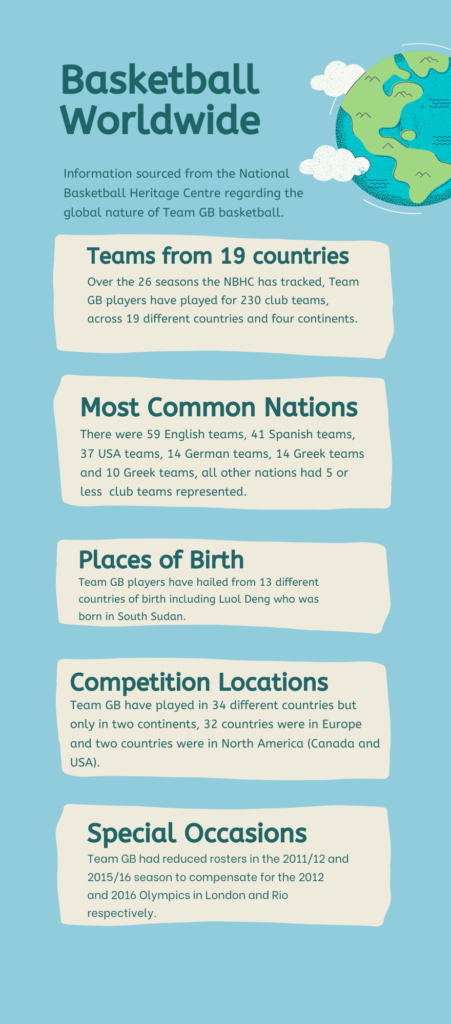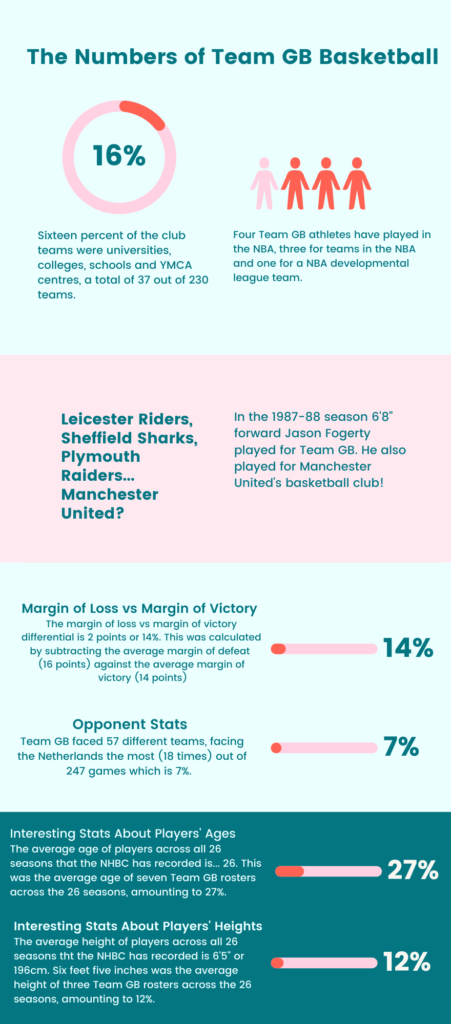National Basketball Heritage Centre: Team GB Through The Numbers
The National Basketball Heritage Centre (NBHC) was founded in 2015 and it is based at the University of Worcester.
The idea of the NBHC arose in 2012 when founders Jenny Collins and John Atkinson were working at the 2012 London Olympics.
Collins said: “The people who sorted out the GB team for the 2012 Olympics suddenly started saying that they were the first GB team, which they weren’t, because we had GB women.
“John and I had conversations and we were very aware that actually, the history of basketball in this country and in Great Britain wasn’t documented anywhere really.”
Collins and Atkinson saw this gap and decided to fill it with the basketball resources they had collected over the years.
The NBHC is made up of a collection of statistical data, yearbooks, match programmes, magazines and other memorabilia.
Statistics start from the 1947-48 season to the present and cover 26 seasons of Team GB basketball.
Basketball Worldwide

Basketball is now a worldwide sport. Just take a look at the NBA who have organisations across the world including NBA Africa, NBA Asia and NBA Europe.
Team GB basketball is no different, and the NBHC expresses that in many ways. Over the 26 seasons that the NBHC has tracked, Team GB athletes have played for 230 different club teams, across 19 countries and four continents.
England had the most teams represented in the data (59) and some notable teams include those that were affiliated with football clubs in the past like Crystal Palace and Everton Tigers.
The most famous of the football club affiliates would have to be Manchester United of whom 6’8” forward Jason Fogerty played for in the 1987-88 season as a 20-year-old.
Another notable storyline was the ‘Cinzano Sutton & Crystal Palace’ team. John Atkinson worked as a statistician for Crystal Palace in the 1970s and explained how this collaboration came about.
Atkinson said: “In 1975/76, the Crystal Palace club were in the quarter finals, and missed by a basket making the semi-finals of the Cup Winners Cup.
“They were one basket away from beating Cinzano Milan. Because we did so well, they gave us their sponsorship, Cinzano did, and there was a two year deal here in the late 70s.”
Only one club team was from Asia and one from South America in the data set. Forward Flo Larkai played for the Sendai 89ers in Japan during the 2012-13 season. Additionally, centre Fahro Alihodžić played for Estudiantes Concordia in Argentina during the 2014-15 season.
As well as playing for teams all around the world, the multiculturality of Team GB basketball is well represented by the athletes’ birthplaces which include 13 different countries, like former NBA all-star Luol Deng who was born in South Sudan
Global Potential
Team GB competitions have spanned across 34 different countries in Europe and North America.
Whilst players have travelled all over the globe to play club basketball, Team GB has been limited to playing in Europe primarily.
One way to look at the situation is a European nation is more likely to play in European competitions such as the FIBA EuroBasket.
Competitions like the Olympics and FIBA World Cup have international pedigree but Africa in particular has seemingly always suffered from underrepresentation
Of the 19 FIBA World Cups, Africa has not hosted one. Considering four of the 13 countries represented in the player’s birthplaces are African (Nigeria, South Sudan, Cameroon and Ghana), Team GB could do more to engage with African basketball nations.
Team GB has faced 57 different opponents over the 26 seasons the NBHC has recorded and only two of those have been African (Nigeria and Egypt).
However, the onus does not solely lie with Team GB, as African nations have only found their feet in basketball in recent decades.
Star-Studded Appearances

According to the NBHC data set, there have been four Team GB players who have played NBA basketball, three in the official NBA and one in the NBA development league.
Pops Mensah-Bonsu played for the Toronto Raptors, Eric Boateng played for the Austin Toros, Ryan Richards played for the San Antonio Spurs and Luol Deng played for the Chicago Bulls.
Luol Deng is possibly the most successful of Team GB’s players. The number seven overall pick in the 2004 NBA draft had a 15 year career in which he averaged almost 15 points per game
The 2007-08 Team GB season was the most star studded, with the aforementioned NBA players involved, excluding Richards.
Additionally, 20-year-old Joel Freeland was on the roster and playing in Spain at the time. However he would go on to sign for the NBA’s Portland Trail Blazers in 2012.
Freeland played his last game for Team GB after the 2012 Olympics and did not play for the team during his stint in the NBA, according to the NBHC.
The head coach during the 2007-08 season was Chris Finch who is currently the head coach of the NBA’s Minnesota Timberwolves.
Finally, the assistant coach in 2007-08 was Nick Nurse, who is the head coach of the NBA’s Toronto Raptors, winning the NBA championship in the 2018-19 season.
This season Team GB has had a good run of results, racking up three wins in a row in the recent EuroBasket 2022 qualifiers.
With organisations like the National Basketball Heritage Centre working diligently, here’s hoping Team GB can create more great moments that can be documented for future generations.